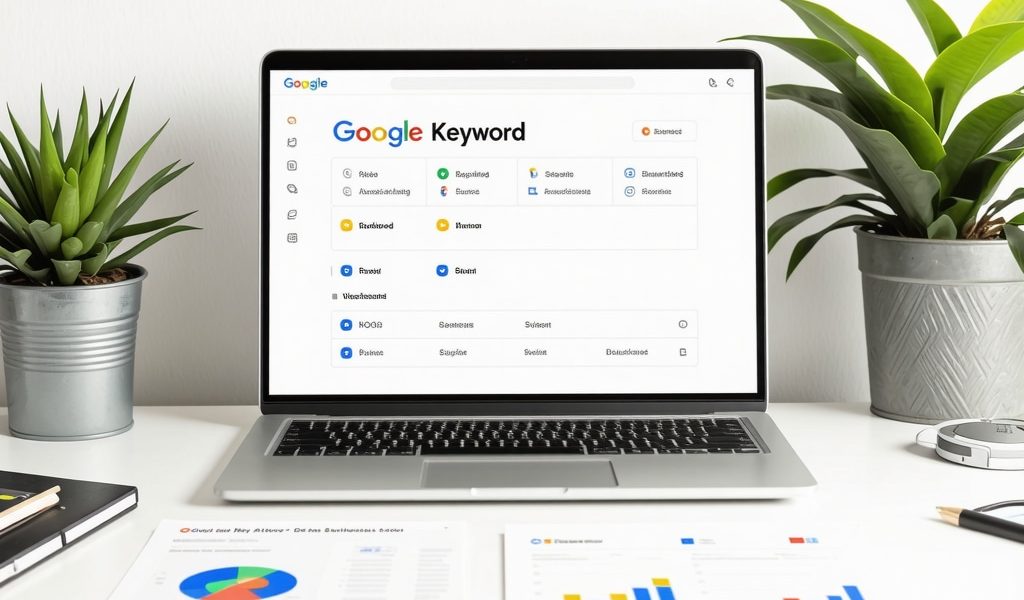Leveraging Google Keyword Planner to Refine GMB SEO Strategy
Google Keyword Planner, traditionally a cornerstone tool for paid search campaigns, has evolved into an indispensable asset for optimizing Google My Business (GMB) profiles. Integrating this tool into your local SEO workflow unveils a nuanced approach to capturing latent demand in localized search queries. Such precision targeting elevates your GMB presence beyond basic listing optimization, ensuring your business organically appears in high-intent, geographically relevant searches.
Decoding Semantic Search Intent with Keyword Planner Data
Advanced practitioners recognize that the latent semantic indexing (LSI) keywords surfaced by Google Keyword Planner empower marketers to align GMB content with user intent more effectively. By analyzing keyword variations, search volume trends, and competition metrics, you can craft GMB business descriptions and posts that resonate with nuanced search behaviors, such as “near me” queries or hyperlocal service requests. This semantic alignment is critical for securing top positioning within Google’s Local Pack and Maps results.
How Can Google Keyword Planner Insights Optimize GMB Content for Maximum Local Visibility?
To capitalize fully, start by segmenting keywords by location specificity and search intent. For example, use Planner to identify long-tail keywords with moderate search volume but high local relevance. Incorporate these keywords strategically into your GMB business description, services list, and Google Posts to amplify relevance signals. Additionally, monitor seasonal or event-driven keyword fluctuations to time content updates that align with consumer demand peaks, thereby increasing local traffic and engagement.
Integrating Keyword Planner with Citation and Review Strategies
Keyword Planner insights also inform citation building and review solicitation tactics. By targeting keywords that reflect customer queries, you can guide citation content and review request templates, enhancing keyword-rich mentions across authoritative local directories. This synergy bolsters your GMB ranking factors, reinforcing trustworthiness and authoritativeness in Google’s algorithmic assessment.
Practical Use Case: Enhancing a Local Bakery’s GMB Profile
Consider a local bakery aiming to dominate “best gluten-free cakes near me.” Using Google Keyword Planner, the business identifies related keywords like “gluten-free birthday cakes [city],” and “custom cakes baker [neighborhood].” Integrating these into their GMB description and posts, while soliciting reviews that mention these terms, significantly improves their visibility for specific, high-conversion local searches—demonstrating the value of data-driven local SEO tactics.
For further deep dives into comprehensive local SEO strategies, explore our detailed guide on local SEO optimization techniques to enhance your Google Business performance.
To complement your keyword research with actionable insights on citation management, consider reading our expert advice on using GMB content updates for local SEO growth.
CTA: To master the full spectrum of Google Business SEO and uncover advanced tactics for 2025, visit our comprehensive master guide and contribute your professional insights to our thriving local SEO community forum.
For authoritative evidence supporting the efficacy of keyword optimization in local search, consider the findings published in the Journal of Digital Marketing Research, which underscores the correlation between keyword-focused content strategies and improved local search rankings.
Unveiling the Power of Seasonality and Trend Analysis in GMB Keyword Strategy
Beyond static keyword research, Google Keyword Planner offers valuable insights into seasonal trends and shifting consumer behaviors that can drive meaningful traffic to your Google My Business profile. By closely monitoring search volume fluctuations over time, businesses can anticipate demand spikes and tailor their GMB posts, offers, and descriptions accordingly. For instance, a landscaping company might notice increased searches for “garden cleanup services” in early spring and adjust their GMB content to reflect timely promotions, thereby capitalizing on seasonal intent.
Integrating this dynamic approach requires setting up periodic keyword audits using Keyword Planner’s historical data, ensuring your GMB content remains aligned with evolving local search patterns. This not only enhances relevance but also signals to Google that your listing is actively maintained and responsive to user needs, contributing to improved local rankings.
Leveraging Competitive Keyword Intelligence for Strategic GMB Positioning
Another advanced dimension is the utilization of Keyword Planner to analyze competitor keyword targeting. By identifying keywords your local competitors rank for but you have yet to optimize, you can uncover hidden opportunities to capture incremental local traffic. For example, if a competitor’s GMB profile consistently appears for “emergency plumbing services [city],” integrating this phrase into your own GMB description and posts can help bridge the gap.
This competitive intelligence approach should be complemented by on-page GMB optimization and local citation alignment to ensure consistency across all local SEO signals. Combining these elements creates a robust ecosystem that reinforces your relevance and authority in Google’s local search algorithm.
What Are the Best Practices for Integrating Keyword Planner Data with GMB Review Generation and Citation Management?
Effective local SEO demands a holistic strategy where keyword insights drive multiple facets of GMB optimization, including reviews and citations. To maximize impact, begin by crafting review request templates that gently encourage customers to mention targeted keywords naturally, such as specific services or neighborhoods. This approach enriches your GMB profile with authentic, keyword-rich testimonials that enhance your local relevance.
Simultaneously, align citation building efforts with your keyword strategy by ensuring that business descriptions and service mentions on authoritative local directories incorporate these keywords. This practice not only strengthens your citation profile but also amplifies the semantic signals sent to Google, contributing to higher local rankings.
For an in-depth guide on citation management techniques that synergize with keyword strategies, explore our resource on managing GMB citations effectively.
Expert Insights on Keyword Optimization Impact in Local SEO
Recent studies published in the Search Engine Land underscore that businesses employing granular keyword segmentation in their local SEO efforts consistently outperform competitors lacking such focus. The findings highlight that keyword-driven content optimization correlates strongly with increases in local pack visibility and click-through rates, validating the strategic use of tools like Google Keyword Planner for GMB enhancements.
To deepen your expertise and implement these advanced tactics seamlessly, consider our comprehensive walkthrough on step-by-step GMB listing optimization for rapid ranking improvements.
CTA: Share your experiences or challenges with integrating keyword data into your GMB SEO strategy in the comments below. Join our community of local SEO experts and discover tailored advice to elevate your Google Business profile.
Deciphering User Behavior Patterns Through Advanced Keyword Metrics
Beyond mere search volume and competition scores, Google Keyword Planner provides granular metrics such as “top of page bid range” and keyword relevance scores—data points often overlooked by local SEO practitioners. These metrics offer insights not only into the commercial intent behind keywords but also into user engagement likelihood. For instance, a higher top-of-page bid suggests keywords with strong transactional intent, which local businesses should prioritize within their GMB content to attract ready-to-convert customers. Combining these insights with behavioral analytics from Google Analytics can help create a sophisticated feedback loop, enabling continuous refinement of your GMB keyword strategy.
Semantic Clustering: Crafting Content Ecosystems Within Your GMB Profile
Emerging local SEO methodologies advocate for semantic clustering—organizing related keywords into thematic groups and weaving them naturally into your GMB posts, Q&A sections, and descriptions. This approach leverages Google’s evolving natural language processing capabilities, ensuring your business profile captures a broader spectrum of search queries without diluting relevance. For example, a “plumbing repair” service could cluster keywords like “emergency plumbing,” “pipe leak fix,” and “water heater repair” into distinct but interconnected content segments within their GMB profile, enhancing topical authority and improving local search rankings.
How Does Semantic Clustering Influence Google’s Local Search Algorithm?
Semantic clustering aligns your GMB content with Google’s BERT and MUM algorithms, which prioritize understanding context and intent over exact keyword matches. By grouping semantically related keywords, your profile signals comprehensive expertise in a service area, increasing the likelihood of appearing in varied but relevant local searches. This strategy not only boosts visibility but also improves user engagement metrics by delivering content that matches nuanced search intents, which Google interprets as higher quality and relevance.
Leveraging Predictive Analytics from Keyword Trends for Proactive GMB Updates
Advanced users harness Keyword Planner’s historical data combined with tools like Google Trends to build predictive models forecasting keyword demand spikes. For example, integrating seasonal keyword trends with local event calendars can guide timely GMB updates and promotional posts that capitalize on anticipated search surges. A tourism-focused business might preemptively optimize for keywords related to “summer hiking trails” or “winter ski rentals” months in advance, securing early ranking advantages.
Implementing such predictive tactics requires cross-functional collaboration between SEO specialists, content creators, and marketing strategists to ensure GMB content remains dynamic and aligned with market movements. The payoff is a resilient local SEO presence that adapts fluidly to emerging opportunities.
Integrating Keyword Planner Insights with Voice Search Optimization for GMB Profiles
With voice-activated searches on mobile and smart home devices growing exponentially, tailoring your GMB keyword strategy for natural language queries is imperative. Keyword Planner can help identify conversational phrases and question-based keywords—often longer and more specific—that users employ in voice searches, such as “where can I find gluten-free cakes near me?” or “emergency plumber open now in [city].”
Optimizing your GMB description, Q&A, and posts with these natural language keywords enhances your profile’s compatibility with voice search algorithms, increasing your chances of appearing in zero-click local answers and voice assistant recommendations.
Advanced Cross-Channel Keyword Alignment: Synchronizing GMB with PPC and Organic SEO
One often underutilized strategy is harmonizing keyword targeting across Google My Business, paid search advertising, and organic website SEO. Google Keyword Planner serves as the linchpin in this endeavor, enabling consistent keyword messaging that amplifies brand signals across channels. This synergy not only consolidates your digital footprint but also maximizes bid efficiency in PPC campaigns by focusing on high-converting local keywords identified through GMB performance analytics.
This integrated approach demands sophisticated tracking and attribution models to measure the impact of each channel and adjust bids and content strategies dynamically for optimal ROI and local search dominance.
CTA: Ready to elevate your GMB profile with cutting-edge keyword strategies? Explore our in-depth guide on advanced keyword optimization and join our expert forum to exchange insights with top local SEO professionals.
For a scholarly perspective on semantic relevance and local search ranking factors, refer to the comprehensive study published in the ACM Digital Library on Semantic Search and Local SEO, which elucidates the role of semantic keyword clustering in enhancing local search results.
Deep Dive into Hyperlocal Keyword Segmentation for Niche Market Domination
In the evolving landscape of Google My Business optimization, hyperlocal keyword segmentation emerges as a critical tactic, enabling businesses to infiltrate micro-moment searches with surgical precision. By dissecting Keyword Planner data down to neighborhood, zip code, or even street-level granularity, SEO specialists can tailor GMB content that resonates not only broadly but also with hyper-specific local intents. This practice enhances relevance for users performing ultra-targeted queries such as “vegan cafes open late in [district]” or “24-hour emergency locksmith near [landmark].” Leveraging these insights requires leveraging geo-modifiers and long-tail variants strategically within GMB descriptions, product/service listings, and Google Posts to secure competitive advantages in fragmented local markets.
Augmenting GMB Profiles with Predictive Keyword Analytics and AI-Driven Content Personalization
Beyond historical trend analysis, the integration of AI-driven predictive analytics with Keyword Planner insights enables proactive GMB content personalization. By forecasting user search behaviors and intent shifts, businesses can dynamically update GMB posts and Q&A sections with tailored messaging that anticipates customer needs. For example, a fitness studio might deploy AI models to predict rising interest in “outdoor boot camps” during early summer, updating their GMB profile preemptively to capture emerging demand. This fusion of predictive analytics and semantic keyword clustering ensures that GMB listings remain vibrant, contextually relevant, and algorithmically favored.

How Can AI-Powered Predictive Models Enhance Local Keyword Strategy Integration within GMB Profiles?
AI-powered predictive models analyze multifaceted datasets—including seasonality, competitor activity, and shifting user preferences—to suggest optimal keywords and content updates for GMB profiles. This approach transcends static keyword research by facilitating continuous adaptation, enabling businesses to stay ahead of competitors by engaging users with timely, context-aware GMB content. Furthermore, AI can automate keyword clustering and content recommendations, streamlining workflows and ensuring semantic cohesion across all GMB elements.
Elevating Link Equity through Keyword-Aligned Local Partnerships and Citation Networks
Advanced GMB SEO strategies also emphasize cultivating local partnerships that reinforce keyword-aligned link equity. By collaborating with complementary local businesses and industry-relevant directories, you can build a citation network rich in semantically relevant anchors and descriptive mentions. These high-quality citations amplify trust signals and local authority, which Google increasingly values in its ranking algorithms. Employing Keyword Planner data to identify mutually beneficial keyword themes for partnership campaigns further multiplies visibility and domain relevance within your geographic niche.
Synergizing Voice Search Optimization with Contextual Keyword Strategies for Conversational GMB Engagement
As voice search commands become more conversational and context-rich, optimizing GMB profiles for natural language queries is paramount. Advanced practitioners utilize Keyword Planner to extract colloquial phrases and question-based keywords that mirror everyday speech patterns, integrating these within GMB Q&A, posts, and even review responses. This nuanced optimization increases the likelihood of triggering voice assistant results and featured snippets, particularly for “near me” and immediate intent searches, which are prevalent in mobile and smart device contexts.
Authoritative Resource Spotlight
For an in-depth exploration of AI-driven local SEO and predictive keyword analytics, the article Predictive Analytics in Local SEO published by Search Engine Journal offers cutting-edge methodologies and case studies demonstrating measurable uplifts in local search performance.
Engage with the Frontier of GMB Keyword Strategy Excellence
Embrace these sophisticated keyword segmentation, predictive analytics, and AI-driven personalization techniques to elevate your Google My Business profile beyond conventional optimization. Engage with our advanced local SEO community forums and access exclusive masterclasses featuring real-world applications of these strategies. Unlock the potential to dominate your niche with precision and foresight—start transforming your GMB presence today.
Expert Insights & Advanced Considerations
Semantic Clustering Transforms Local Relevance into Ranking Authority
Beyond targeting isolated keywords, grouping semantically related terms within your GMB profile signals comprehensive expertise to Google’s advanced algorithms like BERT and MUM. This approach not only broadens your visibility across diverse but relevant queries but also enhances user engagement by addressing nuanced intents within your niche. Implement semantic clusters naturally in your business descriptions, posts, and Q&A to create a cohesive content ecosystem that maximizes your Google My Business SEO impact.
Predictive Analytics Enable Proactive Optimization for Seasonal and Emerging Trends
Leveraging Google Keyword Planner’s historical data alongside AI-driven predictive models allows businesses to anticipate fluctuations in local search demand. This foresight facilitates timely updates to GMB content—such as posts and offers—positioning your profile advantageously ahead of seasonal peaks or local events. Proactive keyword strategy adjustments based on predictive insights ensure sustained local relevance and higher rankings throughout the year.
Hyperlocal Keyword Segmentation Unlocks Micro-Market Dominance
Dissecting keyword data to neighborhood, zip code, or landmark levels empowers hyper-targeted optimization within your GMB profile. This granularity captures ultra-specific search intents, often overlooked by competitors, enabling your business to dominate micro-moment local queries. Integrate geo-modifiers and long-tail variants strategically in your GMB elements to capitalize on fragmented local markets and secure a competitive edge.
Cross-Channel Keyword Alignment Amplifies Brand Signals and Maximizes ROI
Synchronizing keyword strategies across Google My Business, paid search campaigns, and organic SEO consolidates your local search footprint. Utilizing Google Keyword Planner as the central tool ensures consistent messaging and efficient budget allocation, enhancing both your organic rankings and paid advertising performance. This integrated approach demands precise tracking but yields superior visibility and conversion outcomes in competitive local landscapes.
Voice Search Optimization Demands Conversational Keyword Integration
With the surge of voice-activated queries, optimizing your GMB profile with natural language, question-based keywords extracted from Keyword Planner is essential. Incorporate these conversational phrases into your GMB Q&A, posts, and descriptions to improve compatibility with voice assistants and capture zero-click local answers. This nuanced optimization is critical for capturing mobile and smart device users seeking immediate, localized solutions.
Curated Expert Resources
- RankingSEO GMB Comprehensive Local SEO Optimization Techniques: A foundational resource detailing practical, data-driven strategies for elevating Google Business performance across multiple dimensions. (Explore here)
- Search Engine Land’s Article on Local Keyword Research: Offers empirical data and tactical insights demonstrating how granular keyword segmentation drives superior local pack visibility and user engagement. (Read more)
- ACM Digital Library on Semantic Search and Local SEO: An authoritative academic study explicating the role of semantic clustering in enhancing local search relevance and rankings. (Access the study)
- Search Engine Journal’s Predictive Analytics in Local SEO: Cutting-edge methodologies and case studies showcasing measurable uplifts in local search performance through AI-driven forecasting. (Explore article)
- RankingSEO GMB Citation Management Guide: Expert advice on aligning citation building with keyword strategies to amplify local search authority and trustworthiness. (Learn more)
Final Expert Perspective
Mastering Google Keyword Planner for Google My Business SEO in 2025 requires embracing a multifaceted, data-driven approach that integrates semantic clustering, predictive analytics, hyperlocal segmentation, and cross-channel alignment. These advanced strategies empower businesses to anticipate market shifts, dominate niche queries, and synchronize their digital presence across paid and organic channels. Voice search optimization further enhances accessibility in an increasingly conversational search landscape. For those committed to sustained local dominance, these insights form the blueprint for elevating your Google Business profile beyond traditional tactics.
To deepen your expertise, consider exploring our comprehensive master guide and join our vibrant community of local SEO professionals. Share your experiences, challenges, and breakthrough strategies as you refine your Google Keyword Planner integration for superior GMB performance.



